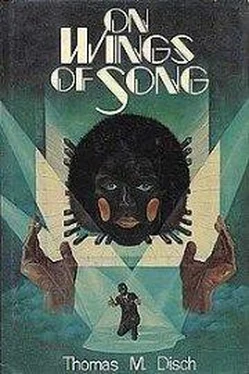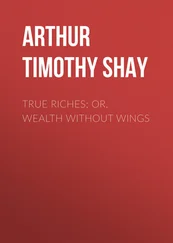“Mm. But it isn’t what I want. Not for ever.”
“I didn’t suppose it was. So what it boils down to — pardon me for putting it so bluntly — is whether you want to take a big gamble.”
“Gamble?”
“Don’t make me spell it out, Danny. I am not a fool. I wasn’t born yesterday.”
“I still don’t know what you mean.”
“For heaven’s sake, I know that you and Miss Whiting aren’t performing duets down here all the time. You can hear that piano all over the house — when someone’s playing it.”
“Are you complaining?”
“Would it do any good? No, in fact, I think it’s wonderful that you two young people should have strong interests in common.” She grinned accusingly. “And what you choose to do down here is none of my business.”
“Thanks.”
“So I’ll say only this: nothing ventured, nothing gained.”
“You think I should stay in town this summer.”
“Let’s say I won’t reproach you for enjoying yourself a bit, if that’s what you want to do. And I’ll see that Abe doesn’t either.”
He shook his head. “It’s not what you think, Mom. I mean, I like Boa and all, but we neither of us believe in… um…”
“Matrimony?”
“You said it, I didn’t.”
“Well, candidly, neither did I at your age. But anyone who crosses the street can be hit by a truck.”
Daniel laughed. “Really, Mom, you’ve got it all turned round backwards. The way I see it, the real choice is whether I can afford to turn down the money Bob is offering for the sake of having a bit of fun.”
“Money is a consideration, that’s so. No matter how nice they are, or how considerate, rich people will involve you in spending more than you can possibly afford. I sometimes think it’s their way of weeding the rest of us out. I say that from bitter experience.”
“Mom, that’s not the case. I mean, there’s no way to spend that kind of money in Amesville. Much less, at Worry.”
“Well, well. I’d love to be proven wrong. But if you should need a few dollars sometime, to tide you over, I’ll see what I can do.”
“That’s very sweet of you. I think.”
Milly looked pleased. “One more word of advice, and I’ll leave you to the horns of your dilemma. Which is — I trust that one of you is taking suitable precautions.”
“Um, yes. Usually.”
“Always. With the rich, you know, things don’t work the same. If a girl finds herself pregnant, she can go off for a holiday and get rid of her embarrassment.”
“Jesus, Mom, I hope you don’t think I’ve been planning to get Boa knocked up. I’m not stupid .”
“A word to the wise. But if my back should ever be turned, you’ll find what you need in the upper left drawer of the chest-of-drawers. Lately, though this is strictly between us, I haven’t had much use for them.”
“Mom, you’re too much.”
“I do what I can.” She held up the coffee pot. “You want any?”
He shook his head, then reconsidered and nodded, and finally decided against it and said no.
Though she had been three times married, Miss Harriet Marspan seemed, at the age of thirty-seven the incarnation of Spinsterhood, its deity or patron saint, but at the huntress rather than the virgin-martyr end of the scale. She was a tall, sturdy-looking woman with prematurely gray hair and sharp, appraising gray eyes. She knew all her own good points and the basic skills of enhancing them, but nothing she could do could counteract the basic chill emanating from her as from the entrance to a food locker. Miss Marspan was oblivious to this, and acted on the assumption that she was rather a lot of fun. She had a silvery, if not contagious, laugh, a shrewd wit, perfect pitch, and unremitting powers of concentration.
Boa had become her favorite neice during the term of her exile to Vilars, to which Miss Marspan, though not a skier, had made several visits at the height of the season. Additionally, Boa had twice spent the holidays with Miss Marspan at her Chelsea flat, being taken about to operas, concerts, and private musicals every night of her visit. At the dinner table of Lord and Lady Bromley (Bromley was an important television producer) Boa had sat between the composer Lucia Johnstone and the great castrato Ernesto Rey. And through it all they had pursued with endless patience, with infinite caution, with delectable subtlety, the one subject in which Miss Marspan chose to interest herself — musical taste.
As to music per se , Boa thought that for a woman of such definite opinions Miss Marspan was oddly lacking in preferences. She could (for instance) make the finest discriminations among the various interpretations of a Duparc song but seemed to have little interest in the song itself, except as an arrangement of vowels and consonants to be produced in accordance with the rules of French phonetics. “Music,” she liked to say, “doesn’t mean a thing.” Yet the music she enjoyed most was Wagner’s, and she was a mine of information about the associated stage business she’d witnessed during different performances of the Ring. Daniel found this more disconcerting than Boa, who was used to similar equivocations from her father. Boa insisted that it must be simply a matter of age: after a while one took the basic amazement of art for granted, much as one might take for granted the rising of the sun in the morning, its setting in the evening. As a theory Daniel couldn’t fault this, but he wasn’t convinced either. He disliked and distrusted Miss Marspan, all the while he strained to make a good impression on her. In her presence he behaved as he would have behaved in a church, moving slowly, speaking deliberately, saying nothing that might contradict her established doctrines. Never, for instance, did he declare his deep-felt conviction that Raynor Taylor’s music was dust from the tomb; he deferred as well in the matter of Moravian hymns of Colonial America. He even started enjoying the hymn after a while. The Marspan Iowa Consort never did undertake anything Daniel thought of as serious music, which was both a disappointment and a relief. For all his practice and preparations in the past two years (more than two years now!) he knew he wasn’t ready for much more than the catches, ditties, jingles, and rounds that Miss Marspan, with the help of the library’s data-links, was so ingenious in unearthing from assorted music libraries around the country.
Though he didn’t say so to Boa, not even after Miss Marspan had left, Daniel felt ashamed of himself. He knew that somehow he had cooperated in the subversion of his own principles. The excuse he’d offered himself at the time — that the hours of chit-chat with Miss Marspan had been so vacuous as to amount to no more than the silence he’d maintained in Mrs. Norberg’s classroom — was a crock of shit. What he’d done, plain and simply, was to suck up to her. It was true, then, about money: if you so much as rubbed shoulders with it, it began to corrupt you.
One night, in disgust with himself, and wanting nothing more than to go back to being the person he’d been a year ago, he phoned Bob Lundgren to see if he could get his old job back, but of course it had long since been taken. Bob was drunk, as usual these days, and insisted on hanging on talking even though Daniel told him he couldn’t afford it. Bob made some digs, first about Daniel’s supposed deficits, then about Boa directly. You were supposed to suppose that he was trying to be good-humored in a locker-room way, but his jokes got more and more overtly malicious. Daniel didn’t know what to say. He just sat there, on the edge of his parents’ bed (that was where the phone was), holding the sweaty receiver, feeling worse and worse. A resentful silence grew between them, as Daniel finally refused to pretend to be amused.
Читать дальше












